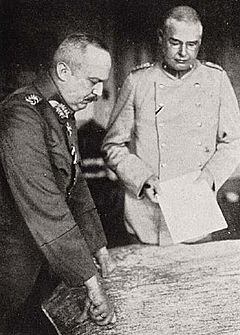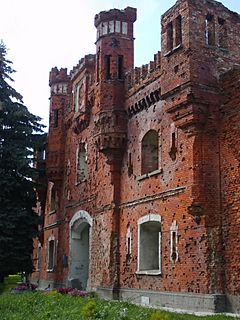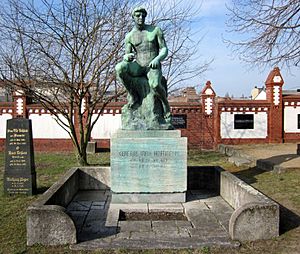Max Hoffmann facts for kids
Quick facts for kids
Max Hoffmann
|
|
|---|---|
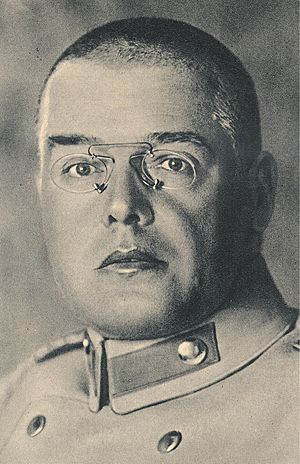 |
|
| Birth name | Carl Adolf Maximilian Hoffmann |
| Born | 25 January 1869 Homberg (Efze), Kingdom of Prussia, North German Confederation |
| Died | 8 July 1927 (aged 58) Bad Reichenhall, Bavaria, Weimar Republic |
| Allegiance | |
| Service/ |
Imperial German Army |
| Years of service | 1887–1918 |
| Rank | Generalmajor |
| Battles/wars | World War I Soviet westward offensive |
| Awards | Pour le Mérite Iron Cross First Class |
Carl Adolf Maximilian Hoffmann (born January 25, 1869 – died July 8, 1927) was a very smart German military planner. At the start of World War I, he was a staff officer. He quickly became the Chief of Staff for the 8th German Army.
Hoffmann, along with generals Hindenburg and Ludendorff, helped plan big wins against the Russian armies. These victories happened at the Battle of Tannenberg and the First Battle of the Masurian Lakes. Later, he was the Chief of Staff for the Eastern Front. In late 1917, he helped negotiate a peace treaty with Russia, called the Treaty of Brest-Litovsk.
Contents
Early Life and Military Training
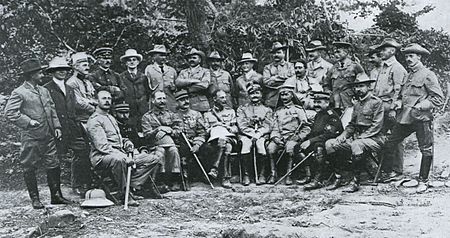
Max Hoffmann was born in Homberg (Efze), Germany. His father was a judge. From 1879 to 1887, he went to school in Nordhausen. After school, he joined the 72nd Infantry Regiment.
One friend remembered him as not the best athlete. But he said Hoffmann "exceeded them in his terrifying appetite." In 1887, he went to officer school in Neisse. He graduated with honors and became a second lieutenant.
From 1895 to 1898, he attended the Prussian War Academy. He then went to Russia to learn the Russian language. He worked for the General Staff from 1899 to 1901. In 1901, he became a captain.
In 1904, the General Staff sent him to Manchuria. He was an observer with the Imperial Japanese Army during the Russo-Japanese War against Russia. He returned to the staff later. In 1911, he taught at the War Academy for two years. He was then promoted to lieutenant colonel.
Hoffmann's Role in World War I
The Eighth Army's Victories
When World War I began, Hoffmann became a key officer for the German Eighth Army. His job was to defend Germany's eastern border from Russian attacks. Most of the German army was fighting in the west, following the Schlieffen Plan.
The Russian army started moving earlier than expected. The Russian First Army invaded East Prussia. The Eighth Army attacked them at the Battle of Gumbinnen but did not win. The Germans then learned that the Russian Second Army was also coming.
The commander of the Eighth Army, Maximilian von Prittwitz, wanted to retreat. But he soon changed his mind. He decided to move his troops to stop the Russian Second Army. However, he and his chief of staff were replaced by Paul von Hindenburg and Erich Ludendorff. Hoffmann knew Ludendorff well.
The two Russian armies were far apart and did not work together well. The Germans knew this from intercepted radio messages. Hindenburg and Ludendorff decided to surround and destroy the Russian Second Army. They won a very important victory at the Battle of Tannenberg. This saved Germany from invasion.
Hoffmann suggested naming the battle "Tannenberg." This name was chosen because it sounded like revenge for a medieval defeat nearby. Next, the Eighth Army attacked the Russian First Army at the First Battle of the Masurian Lakes. This battle also freed most of East Prussia.
Leading the Eastern Front
After these wins, Hindenburg, Ludendorff, and Hoffmann led a new Ninth Army. They stopped a Russian attempt to invade German Silesia. They then took command of all German forces on the Eastern Front. These forces were called Ober Ost.
In the Battle of Łódź, they stopped the immediate threat. Hoffmann believed that with more troops, they could have forced Russia out of the war.
In 1915, Ober Ost launched a surprise attack. They surrounded a Russian army and freed East Prussia. Hoffmann thought they could have dealt a huge blow to Russia. But the Germans were ordered to stop. Instead, they focused on a big attack in southern Poland. This attack was called the Gorlice–Tarnów Offensive.
After the Russians left Poland, Ober Ost was allowed to push into Russia's Baltic areas. By winter, their headquarters were in Kovno, Lithuania. Hoffmann made sure a strong defensive line was built. He visited all the troops, saying, "The mud is terrible."
In 1916, the Russians attacked the Ober Ost defenses. The Germans held their ground. Hoffmann wanted more troops to capture the fortress of Riga. But the German Supreme Commander focused on attacks in the west.
In June, the Russians launched the Brusilov Offensive in the south. They broke through Austro-Hungarian lines. Ober Ost sent troops south, and more came from the west. Hoffmann described the Austrian front as "like a mouth full of sensitive teeth." In July, Hindenburg's command grew to include many Austro-Hungarian troops. Their headquarters moved to Brest-Litovsk.
Chief of Staff in the East
The situation became worse when Romania joined the war against the Central Powers. Hindenburg and Ludendorff became the Supreme Commanders. Field Marshal Prince Leopold of Bavaria took command of three army groups. These groups included German and Austro-Hungarian troops. Hoffmann was very happy to become his chief of staff. He was promoted to major general.
He was supported by a very skilled staff. They commanded all Central Powers forces on the Eastern Front. This included German, Austro-Hungarian, Ottoman, and Bulgarian troops. Since he could no longer visit the front himself, he had an officer, Major Wachenfeld, do it for him. The Russians shifted their attacks south to help Romania. But they were defeated by the Central Powers.
That autumn, Franz Joseph I of Austria died. His successor, Charles I, became commander-in-chief. Hoffmann had a long talk with the young emperor. Hoffmann felt the emperor did not understand military matters well.
By 1917, the Russian infantry seemed tired of attacking. Most only wanted to defend their positions. The February Revolution led to a new Russian government under Alexander Kerensky. Hoffmann wanted to attack.
In July, Kerensky launched an offensive in Galicia. Hoffmann had expected this attack and was ready to counter it. The Austro-Hungarians lost ground at first. But on July 19, Prince Leopold and Hoffmann watched as the Germans counterattacked. The Russians were driven out of Galicia. Hoffmann received an award for his efforts. On September 1, he attacked the Riga fortresses. He took Riga, but most defenders escaped.
On November 26, he received a message from the new Russian Bolshevik government. They asked for a ceasefire. German officials met with the Russian delegation at Hoffmann's headquarters. He helped Foreign Secretary Richard von Kühlmann during the Treaty of Brest-Litovsk negotiations. Hoffmann spoke fluent Russian, which was very helpful.
The negotiations were difficult. A main issue was that Russia would not get back Poland, Lithuania, or Courland. The Central Powers said these areas wanted to be independent.
In December 1917, Hoffmann went to Berlin. The Kaiser asked for his opinion on the German–Polish border after the war. Hoffmann wanted to take only a small strip of land from Poland. This was to avoid having too many new Slavic people in Germany. The Supreme Commanders wanted much more of Poland. They were angry when the Kaiser agreed with Hoffmann. Both threatened to resign. The Kaiser gave in on the border issue. But he refused Ludendorff's demand to send Hoffmann away.
Later, the negotiations continued with Leon Trotsky leading the Russian delegation. Hoffmann did not write any part of the treaty. But Trotsky believed that General Hoffmann was "the only element of serious reality in these negotiations." The Central Powers also negotiated with an independent Ukraine. A peace treaty with Ukraine was signed.
On February 10, Trotsky announced that Russia would end the war but not sign the proposed treaty. Eight days later, the Eastern Army attacked again. They moved through the Baltic areas without much resistance. After two days, the Russians gave in. The treaty was signed on March 3, 1918.
German troops marched into Ukraine to support its new government. They also went further east to get coal and grain. Hoffmann thought Crimea would become a German vacation spot. The Supreme Commanders set up new governments for Ukraine and the Baltic States. This greatly reduced Prince Leopold's and Hoffmann's control. Hoffmann argued that they should fight the Bolsheviks and set up a new government in Russia. But he was not successful.
Later Life
In 1919, Hoffmann was given command of a brigade near the Polish border. The leader of the new small German Army was Hans von Seeckt. Seeckt and Hoffmann had argued during the war.
Hoffmann retired in March 1920. He moved back to Berlin. He made up with Hindenburg at a meeting. He and a businessman named Arnold Rechberg tried to convince Western countries to work together to overthrow the Soviet Union.
He published his wartime memories and thoughts. He also wrote about his views on Russia and his version of the Battle of Tannenberg. Years after the war, while visiting the Tannenberg battlefield, Hoffmann told some army cadets, "See—this is where Hindenburg slept before the battle, this is where Hindenburg slept after the battle, and between you and me this is where Hindenburg slept during the battle."
Max Hoffmann died on July 8, 1927, at a spa in Bad Reichenhall. Some historians consider him "perhaps the most brilliant staff officer of his generation." His work was even used as a model at the United States Army Command and General Staff College.
|
See also
 In Spanish: Max Hoffmann para niños
In Spanish: Max Hoffmann para niños
 | Frances Mary Albrier |
 | Whitney Young |
 | Muhammad Ali |


